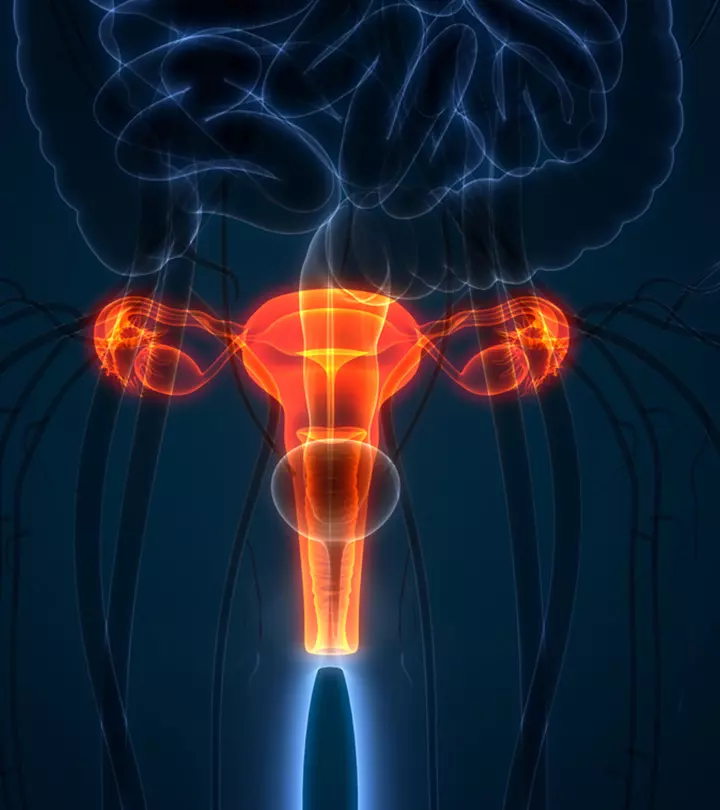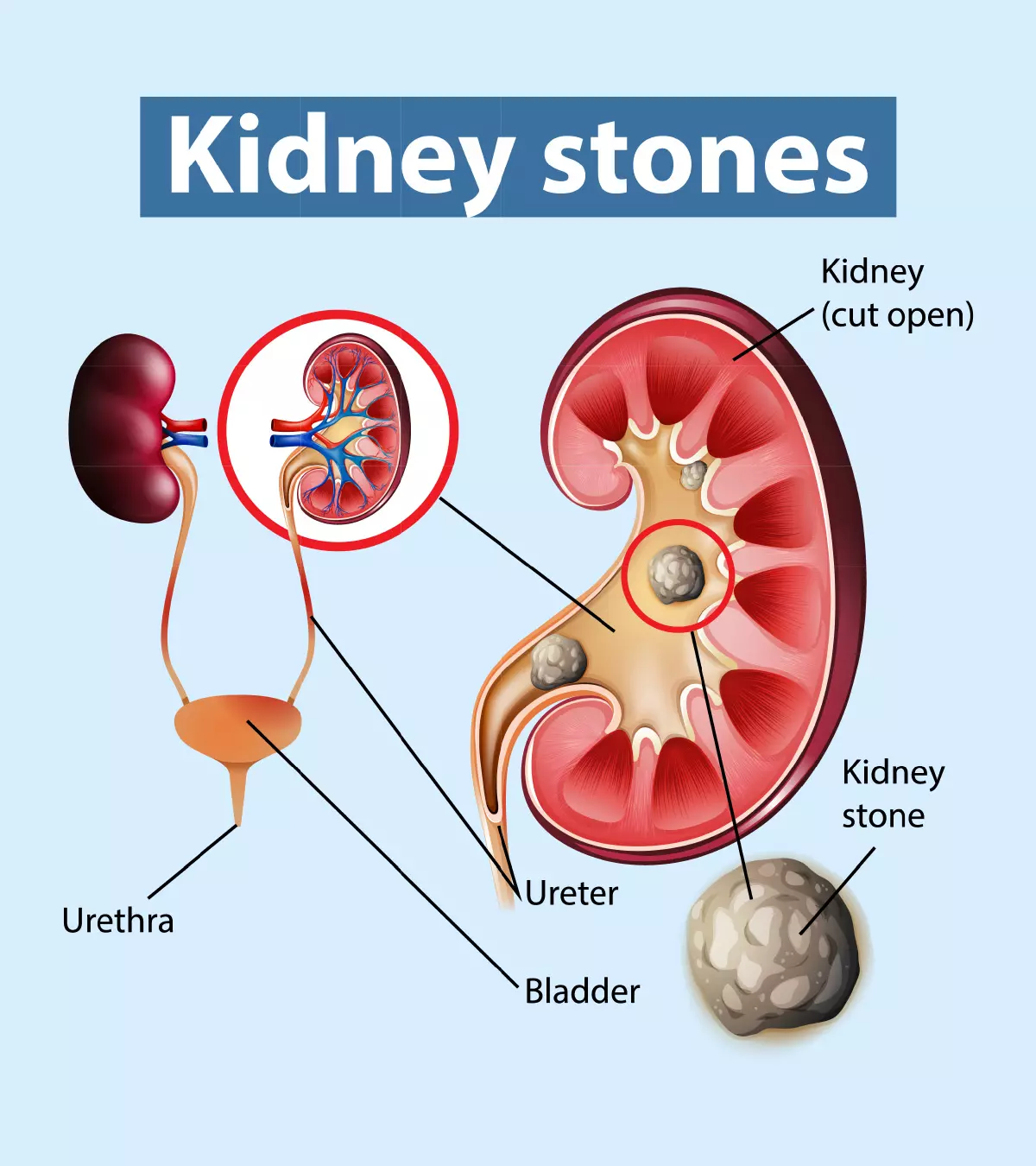

Image: iStock
The vagina stretches to deliver the baby, and hormones control this process. Most women feel that the vagina is looser, tender, and swollen after childbirth. Vaginal changes after childbirth are normal and resolve over time. Although the vagina may not be the same as pre-birth in most mothers, this should not concern women (1). Pelvic floor exercises can help manage post-pregnancy vaginal changes.

Read about the types, causes, and ways to manage changes of the vagina after childbirth.
What Are Common Vaginal Changes After Childbirth?
Vaginal discharge
(lochia) and bleeding is common after delivery. This may last for several days. These changes depend on the mode of delivery, size of the baby, parity, and other individual factors. Women who had multiple vaginal births can have noticeable vaginal changes than others.
Most women may experience the following changes in the vagina after giving birth (2) (3):
1. Vaginal soreness
Vaginal swelling, tenderness, and bruising are common after childbirth due to stretching. Most women experience this soreness in the vagina for six to 12 weeks postpartum.
Vaginal soreness is more common in women who underwent episiotomy, an incision (cut) in the perineum on the vaginal wall towards the anus. Episiotomy is performed to make space for the baby during delivery, and the incision is stitched after delivery. The healing time can be more if the incision is larger. Forceps delivery could also be a reason for severe vaginal soreness.
2. Vaginal tearing
Commonly, the vagina stretches to deliver the baby and is prone to tearing. Most women, especially first-time mothers, experience some degree of vaginal tearing after vaginal delivery. It is treated with stitches that usually dissolve within four to six weeks.
3. Vaginal scarring
The larger tearing may require more time to heal and often results in scarring. Problems with healing could be the reason for distortion or scarring of the wound. Some women may feel pain during intercourse due to scarring, while others may not have any symptoms.
4. Changes in vaginal appearance
The flaps of skin on either side of the vaginal opening, called labia minora, can change their appearance after childbirth. This may appear scarred or reduced in size compared to before delivery. One-sided or both side labial enlargement can also be seen in several women.
5. Wider or loose vagina
The vagina can be wider or looser after childbirth. This is known as vaginal laxity. Pregnancy and childbirth can weaken the pelvic floor muscles and the vaginal muscles. Most women feel the vagina is more loose, soft, and open after childbirth. This is normal and improves gradually.
6. Vaginal dryness
Dryness in the vagina after childbirth can be due to reduced estrogen levels. Breastfeeding also lowers estrogen levels. So most mothers may experience vaginal dryness during exclusive breastfeeding.
Dryness may improve once you stop breastfeeding, and the estrogen levels can return to pre-pregnancy levels.
7. Heaviness in the vagina
Weakness of pelvic floor muscles after childbirth can cause heaviness in the vagina. This feeling usually resolves within a year of postpartum in most mothers. Women with severely damaged pelvic floor muscles experience pelvic organ prolapse. It is when one or more pelvic organs slip down and bulge into the vagina. These are conservatively or surgically managed, depending on the severity and symptoms.
8. Vaginal pain during sex
Most women may experience vaginal pain during sex after delivery. Vaginal injuries, soreness, swelling, or dryness could be the reasons for pain. There is no right time to resume sex after delivery. This may vary based on individual factors. However, it is recommended to seek medical care if you have pain in the perineum.
Sex may not be pleasurable for most women in immediate postpartum weeks since the body is recovering from childbirth, and mothers’ attention and emotions are towards the little one. You may talk to your partner rather than avoid sex and deal with the problem together. It is also advised to use contraception since it is possible to conceive in immediate postpartum weeks.
You may seek medical care if any of these changes or postnatal urine or bowel incontinence is bothering you.
What Causes The Vagina To Stretch During Birth?
A cascade of hormonal reactions occurs in a woman’s body during pregnancy and childbirth. Hormonal changes cause the vagina to stretch during vaginal birth. The following hormones play a key role in vaginal delivery (4):
- Estrogen hormone increases the blood flow to the vagina and keeps the vaginal tissues elastic for childbirth. This allows the vagina to expand and contract during delivery.
- Relaxin hormone softens and relaxes the pelvic ligaments and widens the cervix before childbirth. This allows uninterrupted passage of the baby through the birth canal.
These hormone levels can peak by the end of the third trimester, especially near the due date. After childbirth, the hormonal levels decline and gradually return to pre-pregnancy levels.
How To Tighten The Vagina After Birth?
Pelvic floor exercises
, also called Kegels, are the best ways to tighten up your vagina after childbirth. These exercises strengthen the pelvic floor muscles and are relatively safe in women who had vaginal and cesarean deliveries.
You may do the pelvic floor exercises as mentioned below (5):
- Squeeze and draw in your anus and draw in your vagina upward. This can be similar to how you hold the urge to use the toilet or hold in a tampon.
- Do a set of quick squeezes and then a set of slow squeezes. You may hold the muscle in as long as you can, but not more than ten seconds.
- Repeat this exercise ten times, four to six times a day
It is recommended to seek medical care if the exercise does not improve muscle tone or postnatal incontinence. Physiotherapists can help you learn more exercises to improve muscle strength.
How To Manage The Vaginal Changes After Giving Birth?
Postpartum incontinence, vaginal pain, and vaginal soreness can be improved by Kegels in most mothers. Doctors recommend surgical procedures such as vaginoplasty for changes in vagina persisting over time and not improved with conservative management.
The following tips may help manage vaginal changes after pregnancy and delivery (3):
- Take prescribed painkillers for severe vaginal pain and soreness.
- Keep the perineum clean and dry to promote healing.
- Use lubricants to relieve vaginal dryness. Water-based lubricants are recommended for women using condoms for birth control since oil-based lubricants, lotions, and moisturizers can tear or rip the polyisoprene or latex condoms.
- Apply low-dose estrogen creams to improve vaginal dryness. You may get a prescription from your doctor.
- Consider labiaplasty if you have discomfort due to enlarged labia after birth. Some women may consider labiaplasty as surgery to improve the cosmetic appearance of the labia.
Post-delivery vaginal changes can gradually improve during several weeks postpartum. You should give time for your body to recover. Consider surgical options if required due to medical reasons. However, experts may not recommend vaginoplasty and labiaplasty for cosmetic (aesthetic) reasons due to the risks and complications.
Does Vagina Change After A Cesarean Delivery?
Vaginal changes in women who undergo cesarean delivery can differ from those who had a vaginal delivery. For example, they can experience vaginal dryness and related problems. However, studies show that postnatal sexual function is not affected by the type of delivery.
Pregnancy hormones can cause vaginal changes in all mothers. Hormones prepare pregnant women’s bodies for delivery, so vaginal laxity (looseness) is normal even if you undergo a C-section. In addition, the pelvic floor and vaginal muscles are weakened during pregnancy. However, vaginal recovery can be quicker than natural vaginal birth (6).
Some women may experience vaginal changes after childbirth, such as vaginal dryness, tenderness, tearing, and pain during intercourse. Moreover, the shape and laxity of the vagina might change in women after pregnancy and childbirth due to several reasons, such as hormonal modifications. In most cases, the post-pregnancy vaginal changes resolve after six weeks of delivery. Although your body heals with time, you may try pelvic floor exercises to strengthen the muscles. Nonetheless, seek medical care if you are concerned about constant vaginal pain or discomfort postpartum.
Key Pointers
- Activity of the relaxin and estrogen hormones may cause your vagina to loosen after childbirth.
- Vaginal scarring, dryness, and soreness are a few common changes after giving birth.
- Specific exercises, lubricants, and pain medications may help cope with different vaginal changes.
- Your doctor may recommend alternative approaches depending on your condition.
References
- Your vagina, pelvic floor and bleeding after giving birth.
https://www.nct.org.uk/information/labour-birth/recovery-birth/your-vagina-and-pelvic-floor-after-giving-birth - Childbirth Injury.
https://www.londonwomenscentre.co.uk/our-treatments/prolapse - Vagina changes after birth.
https://www.nhs.uk/page-removed/ - Laura T. Goldsmith and Gerson Weiss; Relaxin in Human Pregnancy.
https://www.ncbi.nlm.nih.gov/pmc/articles/PMC3856209/ - Vaginal Laxity And Childbirth: Is A “Loose Vagina” Common? Treatable?
https://torontophysiotherapy.ca/vaginal-laxity-and-childbirth-is-a-loose-vagina-common/ - L Cai, et al; Does Vaginal Delivery Affect Postnatal Coitus?
https://pubmed.ncbi.nlm.nih.gov/23676889/
Community Experiences
Join the conversation and become a part of our nurturing community! Share your stories, experiences, and insights to connect with fellow parents.
Read full bio of Dr. Uma Mishra
Read full bio of Dr Bisny T. Joseph














